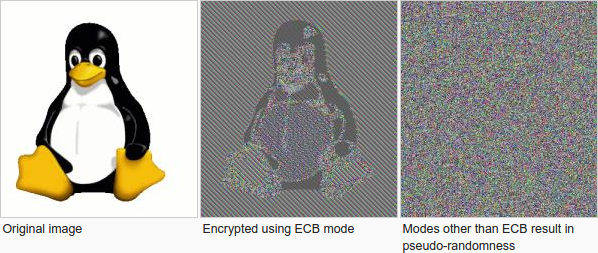Tenho dois projetos um em Java e outro em C# onde os dois se comunicam entre si, e uma das funções e criptografar e descriptografar as informações confidenciais entre eles, utilizando algoritmo Aes, estou tentando criptografar com C# da seguinte forma.
using System;
using System.IO;
using System.Security.Cryptography;
using System.Text;
namespace Aes_Example
{
class AesExample
{
// Mensagem que sera criptografada.
const string mensagem = "Mensagem que sera criptografada.";
// Senha definida da operadora.
const String chave = "uexDPnPr";
public static void Main()
{
try
{
byte[] pwdBytes = Encoding.UTF8.GetBytes(chave);
byte[] keyBytes = new byte[0x10];
int len = pwdBytes.Length;
if (len > keyBytes.Length)
{
len = keyBytes.Length;
}
Array.Copy(pwdBytes, keyBytes, len);
using (Aes myAes = Aes.Create("AES"))
{
myAes.Key = keyBytes;
byte[] encrypted = EncryptStringToBytes_Aes(mensagem, myAes.Key, myAes.IV);
string roundtrip = DecryptStringFromBytes_Aes(encrypted, myAes.Key, myAes.IV);
String TESTE = Convert.ToBase64String(encrypted);
Console.WriteLine("Original: {0}", mensagem);
Console.WriteLine("Criptografado: {0}", Convert.ToBase64String(encrypted));
Console.WriteLine("Descriptografado: {0}", roundtrip);
Console.ReadKey();
}
}
catch (Exception e)
{
Console.WriteLine("Error: {0}", e.Message);
}
}
static byte[] EncryptStringToBytes_Aes(string plainText, byte[] Key, byte[] IV)
{
// Check arguments.
if (plainText == null || plainText.Length <= 0)
throw new ArgumentNullException("plainText");
if (Key == null || Key.Length <= 0)
throw new ArgumentNullException("Key");
if (IV == null || IV.Length <= 0)
throw new ArgumentNullException("IV");
byte[] encrypted;
// Create an Aes object
// with the specified key and IV.
using (Aes aesAlg = Aes.Create())
{
aesAlg.Key = Key;
aesAlg.IV = IV;
// Create a decrytor to perform the stream transform.
ICryptoTransform encryptor = aesAlg.CreateEncryptor(aesAlg.Key, aesAlg.IV);
// Create the streams used for encryption.
using (MemoryStream msEncrypt = new MemoryStream())
{
using (CryptoStream csEncrypt = new CryptoStream(msEncrypt, encryptor, CryptoStreamMode.Write))
{
using (StreamWriter swEncrypt = new StreamWriter(csEncrypt))
{
//Write all data to the stream.
swEncrypt.Write(plainText);
}
encrypted = msEncrypt.ToArray();
}
}
}
// Return the encrypted bytes from the memory stream.
return encrypted;
}
static string DecryptStringFromBytes_Aes(byte[] cipherText, byte[] Key, byte[] IV)
{
// Check arguments.
if (cipherText == null || cipherText.Length <= 0)
throw new ArgumentNullException("cipherText");
if (Key == null || Key.Length <= 0)
throw new ArgumentNullException("Key");
if (IV == null || IV.Length <= 0)
throw new ArgumentNullException("IV");
// Declare the string used to hold
// the decrypted text.
string plaintext = null;
// Create an Aes object
// with the specified key and IV.
using (Aes aesAlg = Aes.Create())
{
aesAlg.Key = Key;
aesAlg.IV = IV;
// Create a decrytor to perform the stream transform.
ICryptoTransform decryptor = aesAlg.CreateDecryptor(aesAlg.Key, aesAlg.IV);
// Create the streams used for decryption.
using (MemoryStream msDecrypt = new MemoryStream(cipherText))
{
using (CryptoStream csDecrypt = new CryptoStream(msDecrypt, decryptor, CryptoStreamMode.Read))
{
using (StreamReader srDecrypt = new StreamReader(csDecrypt))
{
// Read the decrypted bytes from the decrypting stream
// and place them in a string.
plaintext = srDecrypt.ReadToEnd();
}
}
}
}
return plaintext;
}
}
}
Isso me retorna uma string criptografada assim,
NElQHsXIpc+bHezzad/Ubzj94+1YKomH5LwmlDUseQtGs9veFPmUexy82KJTsBVD
E do lado Java tenho.
package Teste;
import java.security.Key;
import java.security.MessageDigest;
import java.util.Arrays;
import javax.crypto.Cipher;
import javax.crypto.spec.SecretKeySpec;
import org.apache.commons.codec.binary.Base64;
import org.apache.commons.lang.StringUtils;
public final class Criptografia {
private static final String ALGORITMO = "AES";
public static String criptografar(String mensagem, String chave) throws Exception {
final Cipher cipher = getCipher(Cipher.ENCRYPT_MODE, chave);
final byte[] criptografado = cipher.doFinal(mensagem.getBytes());
return StringUtils.trim(Base64.encodeBase64String(criptografado));
}
public static String descriptografar(String mensagem, String chave) throws Exception {
final Cipher cipher = getCipher(Cipher.DECRYPT_MODE, chave);
final byte[] descriptografado = cipher.doFinal(Base64.decodeBase64(mensagem));
return new String(descriptografado, "UTF-8");
}
private static Cipher getCipher(final int encryptMode, final String chave) throws Exception {
final Cipher cipher = Cipher.getInstance(ALGORITMO);
cipher.init(encryptMode, buildKey(chave));
return cipher;
}
private static Key buildKey(String chave) throws Exception {
final MessageDigest messageDigest = MessageDigest.getInstance("SHA-256");
final byte[] key = Arrays.copyOf(messageDigest.digest(chave.getBytes("UTF-8")), 16);
return new SecretKeySpec(key, ALGORITMO);
}
/**
* Classe de exemplo de utilizacao. Futuramente passar para o padrao JUnit.
*
* @param args
* nao precisa informar
*
* @throws Exception
* erro na criptografia
*/
public static void main(String[] args) throws Exception {
// Mensagem que sera criptografada.
final String mensagem = "Mensagem que sera criptografada.";
// Senha definida da operadora.
final String chave = "uexDPnPr";
// Valor criptografado.
String criptografado = Criptografia.criptografar(mensagem, chave);
System.out.printf("Valor criptografado: '%s' %n", criptografado);
// Valor original.
String descriptografado = Criptografia.descriptografar(criptografado, chave);
System.out.printf("Valor descriptografado: '%s'", descriptografado);
}
}
Gerando a criptografia.
JGTfV+CntuSutHK0LLeZix9Teu87ynjpJN8d3OaQdWge6yN0stn7/1I5KmMJEFYk
A dificuldade aqui e encontra uma forma que coincida a criptografia gerada no C# sendo que a parte do java não posso altera devido ser do cliente, já cheguei a ver alguns assuntos sobre isso no stackoverflow gringo, mas todos que vi não compreendi como corrigir isso.
Resumindo; preciso que a criptografia gerada no C# seja idêntica a gerada no java.
Para a mensagem = "Mensagem que sera criptografada.";
e a chave = "uexDPnPr";
Tenho hoje.
No C#
NElQHsXIpc+bHezzad/Ubzj94+1YKomH5LwmlDUseQtGs9veFPmUexy82KJTsBVD
Esta criptografia do C# tem que ser idética a do java abaixo.
e no Java.
JGTfV+CntuSutHK0LLeZix9Teu87ynjpJN8d3OaQdWge6yN0stn7/1I5KmMJEFYk

RijndaelManagedcomBlockSize = 128,aesEncryption.KeySize = 256e chaves de 32 bytes (256 bits). Se funcionar me dê um toque que eu escrevo uma resposta.cipher) está usando o padrão ECB, sem o IV (INSEGURO!). Alterando a inicialização para, por exemplo:Cipher.getInstance("AES/CBC/PKCS5Padding")(modo CBC, padrão no .NET), ogetIV()funcionará (essas strings estão na documentação do Cipher). Há outras alternativas (como alterar o código C# para usar o modo ECB e "zerar" o IV), porém, são más-práticas de programação e não recomendo utilizá-las :)byte[] pwdBytes = Encoding.UTF8.GetBytes(chave);pelo código que gera a hash SHA-256 dela:using (SHA256 hash = SHA256Managed.Create()) { Encoding enc = Encoding.UTF8; byte[] pwdBytes = hash.ComputeHash(enc.GetBytes(chave)); }Peguei do (stackoverflow.com/questions/16999361/…) Não estou com um compilador C# aqui para testar, espero que funcione!